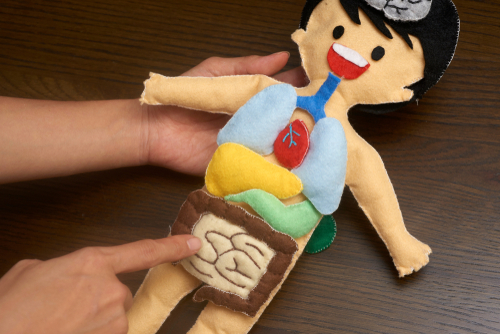Building Strong Bellies from the Start
Children’s digestive systems are still developing, and the choices we make early on—especially around food—can help lay the foundation for long-term gut health. A well-nourished microbiome doesn’t just support smoother digestion; it can also play a role in mood regulation, immune strength, and nutrient absorption.
The good news? Kids don’t need complicated diets to thrive. With a few simple swaps, fun snacks, and creative meal strategies, it’s easy to introduce gut-friendly foods in ways they’ll actually enjoy—without battles at the dinner table.
Ad Banner #1
— Placeholder for the first advertisement —
Why Gut Health Matters for Kids
The gut is home to trillions of microbes, and many of them first take root in childhood. By age 3, a child’s microbiome starts to resemble that of an adult—but how it develops is influenced by everything from birth method and antibiotic use to daily diet and lifestyle.
A balanced microbiome helps:
-
Break down and absorb nutrients efficiently
-
Support the immune system (up to 70% of immune cells live in the gut)
-
Reduce the likelihood of food sensitivities or intolerances
-
Promote regular bowel movements and reduce tummy troubles
-
Encourage calmer moods and better focus via the gut-brain connection
So while kids might not be worried about probiotics and prebiotics, their bodies are listening—and responding—to what’s on the plate.
Easy, Kid-Approved Probiotic Foods
Probiotics are friendly bacteria that help balance the gut. For children, it’s best to introduce these through food first, rather than supplements, unless recommended by a healthcare provider.
Try these kid-friendly options:
-
Yogurt with live active cultures (look for low-sugar or unsweetened versions; sweeten naturally with fruit or a drizzle of honey if age-appropriate)
-
Kefir smoothies made with frozen fruit and banana
-
Cheese—some aged varieties like gouda and cheddar contain probiotics
-
Fermented pickles or sauerkraut—offer tiny amounts, served on the side of a meal or tucked into a sandwich for adventurous eaters
-
Miso soup with soft tofu and noodles
-
Sourdough bread (contains beneficial microbes from fermentation)
Many of these can be blended into what kids are already eating—with no fuss or food fights.
Sneaky Ways to Add Prebiotics and Veggies
Prebiotics are the fuel that helps probiotics grow. They’re found in many fiber-rich plant foods, and while they might not always be a child’s first choice, there are plenty of ways to sneak them in.
Kid-friendly prebiotic boosters:
-
Bananas (especially slightly green ones) in smoothies or muffins
-
Oats in overnight oats, pancakes, or energy bites
-
Apples (with skin) sliced thin or grated into baked goods
-
Leeks and onions finely chopped into soups, sauces, or scrambled eggs
-
Chickpeas and lentils blended into hummus, pasta sauce, or even brownies
-
Asparagus and artichokes roasted and served with dipping sauces
When in doubt, blending veggies into sauces, soups, or smoothies can turn picky eaters into fiber fans—without them even noticing.
Ad Banner #2
— Placeholder for the second advertisement —
Tips to Build Gut-Friendly Habits Early
Making gut health fun and accessible helps create habits that stick. Here are some simple tips for daily life:
-
Serve “rainbow meals”: Encourage variety by turning it into a game—how many colors are on your plate today?
-
Start small: Even one spoonful of sauerkraut or a few sips of kefir counts. Let kids explore new foods at their own pace.
-
Model good habits: Kids are more likely to try fermented or fiber-rich foods if they see you eating and enjoying them too.
-
Avoid over-restriction: Let indulgent foods have a place while focusing on balance. All-or-nothing approaches can create food stress.
-
Limit ultra-processed snacks: These can disrupt microbial balance. Replace them with simple options like yogurt parfaits, nut butter with fruit, or roasted chickpeas.
-
Make digestion-friendly meals: Avoid heavy meals too close to bedtime and watch for overeating, which can stress little tummies.
When Extra Support May Be Needed
If your child experiences frequent tummy aches, constipation, loose stools, or food sensitivities, it may be helpful to track food and symptom patterns. In some cases, working with a pediatrician or nutritionist can uncover hidden intolerances or gut imbalances that benefit from targeted support.
Gentle changes to daily food choices—along with stress reduction, good sleep, and plenty of hydration—often go a long way toward relief.
Growing a Healthy Gut for Life
Helping children build a healthy microbiome doesn’t require perfection. With a little creativity and consistency, probiotic-rich foods, fiber-filled meals, and mindful habits can become a natural part of their daily rhythm. It’s not just about digestion—it’s about building the foundation for lifelong vitality, resilience, and comfort in their own bodies.
When you focus on nourishment over restriction and curiosity over control, kids can grow up trusting their bodies—and enjoying food that loves them back.



























